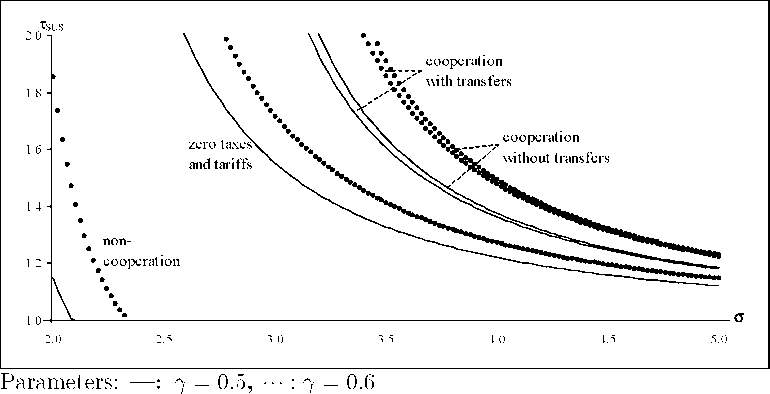which has to be set equal to one to calculate the sustain point. Again, because
of non-linearities in τ only numerical solutions can be derived. Figure 5
presents these sustainpoints for different parameters σ and γ . For comparison
also the sustainpoints of the of the case without any government intervention
and the case of non-cooperation are presented.

Figure 5: Sustain points for different parameters
In all cases τsus increases with γ and decreases with σ . A larger share of
industrial varieties within the consumption bundle strengthens the agglom-
eration (backward) linkage while a lower σ increases industry profits by a
larger mark-up. Mostly striking is the fact that sustain points of the non-
cooperation cases are strictly below the reference cases of zero policies and
even more below the sustain points in case of cooperation. This is mainly a
result of the (positive) optimal tariffs that protect the domestic market and
enables firms to pay higher wages. In case of cooperation optimal tariffs of
the less developed region (at L=0) are even negative and strengthen the real
wage advantage of the already developed region. Furthermore, also transfers
which compensate for the welfare loss cannot improve real wage disadvantage
of the less developed region sufficiently.
However, so far the result has been derived that cooperation damages the
real wage relation and the long-run prospect of convergence of less developed
regions. Since this result maintains even if tranfers compensate for the welfare
17
More intriguing information
1. Should informal sector be subsidised?2. The name is absent
3. The name is absent
4. Place of Work and Place of Residence: Informal Hiring Networks and Labor Market Outcomes
5. The name is absent
6. The name is absent
7. Sectoral Energy- and Labour-Productivity Convergence
8. The name is absent
9. Natural hazard mitigation in Southern California
10. Examining the Regional Aspect of Foreign Direct Investment to Developing Countries